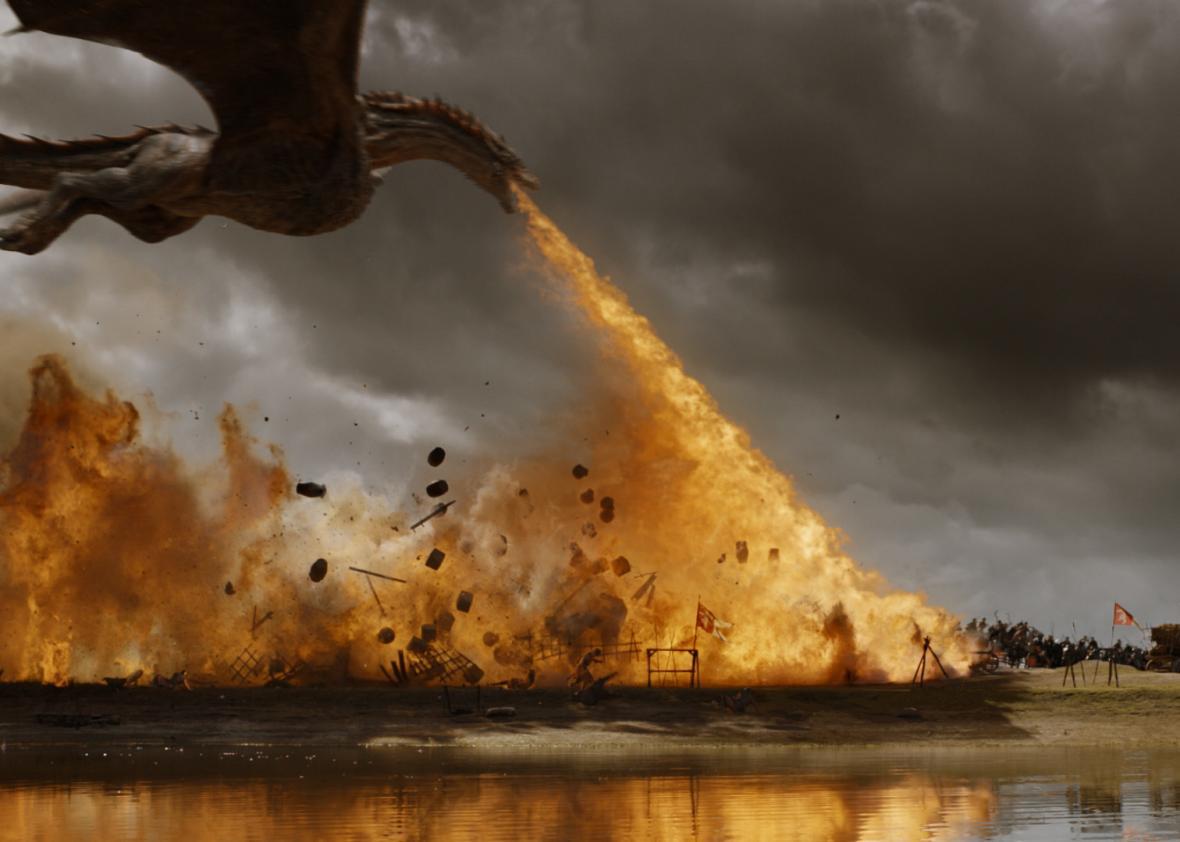Last week on Game of Thrones, a gloating Jaime Lannister touted his ability to learn from his own mistakes. After wrong-footing Daenery Targaryen’s army of Unsullied, he and his troops effectively strolled into the Tyrell stronghold of Highgarden, a battle so lopsided the show didn’t even bother to show it. It was the same strategy, he explained to the vanquished Olenna Tyrell, that the late Robb Stark had used to defeat and capture him in the Battle of the Whispering Wood. (That battle also took place offscreen, but mainly because in Season 1, Game of Thrones didn’t have the budget to stage it.) “There are always lessons in failure,” he smirked. “Yes,” Lady Olenna purred back at him, “you must be very wise by now.”
Want to listen to this article out loud? Hear it on Slate Voice.
If failure makes the Kingslayer wise, then after “The Spoils of War,” he must be fast approaching genius. (Yes, we last saw him sinking towards the bottom of a river, but there’s no chance Game of Thrones would condemn one of its principal characters to such a quiet and inglorious death.) Jaime did manage to get all of House Tyrell’s captured gold past the gates of King’s Landing, but the rest of his supplies, and a few hundred of his troops, were either slaughtered by the Dothraki or roasted alive by Daenerys Targaryen’s dragon. He’d only just dismissed Randyll Tarly’s suggestion that the soldiers be whipped to hasten their forward progress, a decision that played, for a minute or two, like a sensibly reasoned judgement; they’d just won a battle for him, after all. But on Game of Thrones, the compassionate choice, however just, is rarely the correct one.
The Lannister army might have held the line; a phalanx of shields and spears is a good, if not foolproof, defense against a cavalry charge. But as the saying goes about generals, Jaime Lannister was still fighting the last war. He was prepared for men on horseback, but not a woman on a dragon. To borrow a metaphor from outside Game of Thrones’ quasi-medieval frame, Jaime brought a knife to a gun fight.
Regardless of how fetching Nikolaj Coster-Waldau looks in Lannister gold, it’s best for Westeros and the rest of the world that the Lannisters are defeated as quickly as possible. Cersei has her heart set on the Seven Kingdoms, but she has no conception of the true, extinction-level enemy approaching from beyond the Wall. The sooner the Lannisters fall and Cersei suffers an appropriately terrible death, Dany and Jon Snow can properly join forces and set their sights on the Night King’s army to the north.
Unfortunately, it doesn’t look like even the Mother of Dragons is fully prepared for what she’s going to face. She seems to have at least provisionally accepted Jon’s contention that an army of virtually invincible ice people and reanimated skeletons is moving southward to kill them all, but Jon Snow hasn’t just seen the white walkers: He’s fought them. Compare the battles from “Spoils of War” and last week’s “The Queen’s Justice” with the narrow escape of “Hardhome,” and you’ll see an entirely different form of warfare being waged. It’s doubtful there are enough swords in all of Westeros to vanquish the Night King’s ever-growing swarm of undead soldiers.
As military strategists, Jaime and Tyrion are evenly matched—hardly surprising, since they grew up under the same roof. Tyrion outwits his brother, and Jaime returns the favor, and so it might go, back and forth for months that humanity cannot afford to squander. It’s only by ignoring Tyrion, who wanted her to keep her dragons in check and keep the Dothraki away from King’s Landing, that Dany is able to score her first decisive victory. (RIP Olenna Tyrell, who urged Dany—correctly, it turns out—to disregard the counsel of “clever men.”) Her dragon’s fiery breath rips a neat hole in the Lannisters’ front lines, and once they’re broken, the more mobile Dothraki have a decided advantage—enough that one quips to Tyrion, “Your people don’t know how to fight.” The Lannisters are a modern army and they’re equipped to fight other modern armies, not a rain of so-called primitives hurtling at them on horseback. One can only imagine with dread how they’d fare against a never-ending tide of rotting skeletons.
By attacking the supply train rather than the city itself, Dany appears to be hewing at least to the letter of Tyrion’s suggestion to blockade the city; the less—or is that fewer?—provisions Cersei’s army has, the quicker a prospective siege will be over. And she seems to be at least partly heeding the warnings of Jon Snow—the James Carville of Westeros—that if she rains dragonfire down on the Red Keep and burns all her enemies alive, she’ll just be replacing Cersei’s reign of terror with “more of the same.” (Future slogans: “It’s the white walkers, stupid,” and “Don’t forget dragonglass.”) Bran’s vision of a dragon flying over a scorched King’s Landing may yet come to pass, but for now, she’s just making sure people know they’re real, and they’re (nearly) unbeatable.
Olenna had a point when she told Jaime that a common love for their ruler is not enough to keep a populace in line; Margaery Tyrell was beloved, and that didn’t stop Cersei from blowing her to shreds. Dany’s fiery attack is the equivalent of a public nuclear test, albeit with more screaming: It makes it clear that the rules have changed, and what troops are where is now largely academic. The dragons are on the board now, and perhaps fear of them will do until the truly terrifying enemy emerges.
